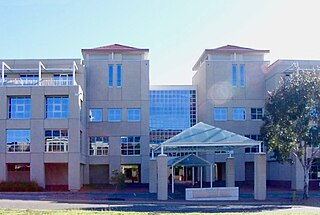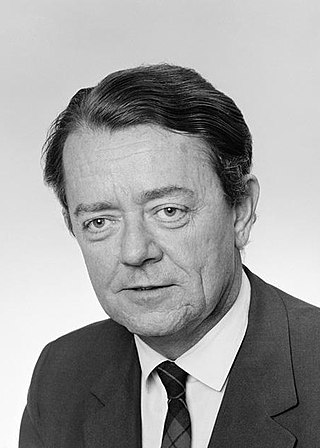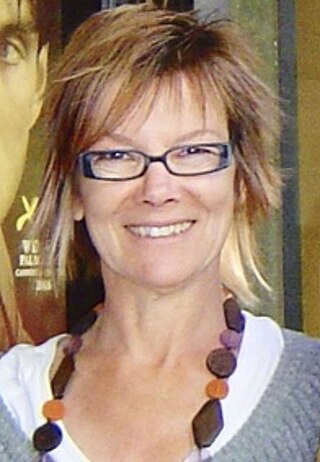
Edward Gough Whitlam was the 21st prime minister of Australia, serving from 1972 to 1975. He held office as the leader of the Australian Labor Party (ALP), of which he was the longest-serving. He was notable for being the head of a reformist and socially progressive administration that ended with his removal as prime minister after controversially being dismissed by the governor-general of Australia, Sir John Kerr, at the climax of the 1975 constitutional crisis. Whitlam is the only Australian prime minister to have been removed from office by the governor-general.
The Australian Security Intelligence Organisation is Australia's national security agency responsible for the protection of the country and its citizens from espionage, sabotage, acts of foreign interference, politically motivated violence, attacks on the Australian defence system, and terrorism. ASIO is part of the Australian Intelligence Community and is comparable to the FBI (US) and MI5 (UK).

The Australian Secret Intelligence Service is the foreign intelligence agency of Australia, tasked with the covert collection of information overseas through personal contacts and other means of human intelligence. It is part of the Australian Intelligence Community and is also responsible for counter-intelligence and liaising with the intelligence agencies of other countries such as the NZSIS. ASIS was formed in 1952 but its existence remained secret within much of the government until 1972. ASIS is comparable to the American CIA and the British MI6.

The Australian Signals Directorate (ASD), formerly the Defence Signals Directorate (DSD), is the federal statutory agency in the Australian Government responsible for foreign signals intelligence, support to military operations, cyber warfare, and information security. ASD is part of the Australian Intelligence Community. ASD's role within UKUSA Agreement is to monitor signals intelligence ("SIGINT") in South and East Asia. The ASD also houses the Australian Cyber Security Centre.

The 1975 Australian constitutional crisis, also known simply as the Dismissal, culminated on 11 November 1975 with the dismissal from office of the prime minister, Gough Whitlam of the Australian Labor Party (ALP), by Sir John Kerr, the Governor-General who then commissioned the leader of the Opposition, Malcolm Fraser of the Liberal Party, as prime minister. It has been described as the greatest political and constitutional crisis in Australian history.

James Ford Cairns was an Australian politician who was prominent in the Labor movement through the 1960s and 1970s, and was briefly Treasurer and the fourth deputy prime minister of Australia, both in the Whitlam government. He is best remembered as a leader of the movement against Australian involvement in the Vietnam War, for his affair with Junie Morosi and for his later renunciation of conventional politics. He was also an economist, and a prolific writer on economic and social issues, many of them self-published and self-marketed at stalls he ran across Australia after his retirement.

The Australian Federal Police (AFP) is the national and principal federal law enforcement agency of the Australian Government with the unique role of investigating crime and protecting the national security of the Commonwealth of Australia. The AFP is an independent agency of the Attorney-General's Department and is responsible to the Attorney-General and accountable to the Parliament of Australia. As of October 2019 the Commissioner of the Australian Federal Police is Reece Kershaw, formerly the Northern Territory Police Commissioner.

Lionel Keith Murphy QC was an Australian politician, barrister, and judge. He was a Senator for New South Wales from 1962 to 1975, serving as Attorney-General in the Whitlam government, and then sat on the High Court from 1975 until his death.

Old Parliament House, formerly known as the Provisional Parliament House, was the seat of the Parliament of Australia from 1927 to 1988. The building began operation on 9 May 1927 after Parliament's relocation from Melbourne to the new capital, Canberra. In 1988, the Commonwealth Parliament transferred to the new Parliament House on Capital Hill. It also serves as a venue for temporary exhibitions, lectures and concerts. Old Parliament House is, looking across Lake Burley Griffin, situated in front of Parliament House and in line with the Australian War Memorial.

The Whitlam government was the federal executive government of Australia led by Prime Minister Gough Whitlam of the Australian Labor Party. The government commenced when Labor defeated the McMahon government at the 1972 federal election, ending a record 23 years of continuous Coalition government. It was terminated by Governor-General Sir John Kerr following the 1975 constitutional crisis and was succeeded by the Fraser government—the sole occasion in Australian history when an elected federal government was dismissed by the governor-general.
The Australian Intelligence Community (AIC) and the National Intelligence Community (NIC) or National Security Community of the Australian Government are the collectives of statutory intelligence agencies, policy departments, and other government agencies concerned with protecting and advancing the national security and national interests of the Commonwealth of Australia. The intelligence and security agencies of the Australian Government have evolved since the Second World War and the Cold War and saw transformation and expansion during the Global War on Terrorism with military deployments in Afghanistan, Iraq and against ISIS in Syria. Key international and national security issues for the Australian Intelligence Community include terrorism and violent extremism, cybersecurity, transnational crime, the rise of China, and Pacific regional security.

Harry Frederick Ernest "Fred" Whitlam was Australia's Crown Solicitor from 1936 to 1949, and a pioneer of international human rights law in Australia. He was the father of Prime Minister Gough Whitlam, and had a great influence on his son's values and interests.

John Murray Wheeldon was an Australian politician and journalist. He was a member of the Australian Labor Party (ALP) and a senator for Western Australia from 1965 to 1981. He held ministerial office in the Whitlam government as Minister for Repatriation and Compensation (1974–1975) and Minister for Social Security (1975). He was known for his views on Australian foreign policy and after leaving politics became an editorial writer for The Australian.

Robert Marsden Hope, was a Justice of the New South Wales Court of Appeal and Royal Commissioner on three separate occasions, most notably the Royal Commission on Intelligence and Security. As a judge Hope was known for his legal positivism and as a royal commissioner he "instilled a sense of impartiality".

Jennifer Jane Hocking is an Australian historian, political scientist and biographer. She is the inaugural Distinguished Whitlam Fellow with the Whitlam Institute at Western Sydney University, Emeritus Professor at Monash University, and former Director of the National Centre for Australian Studies at Monash University. Her work is in two key areas, counter-terrorism and Australian political biography. In both areas she explores Australian democratic practice, the relationship between the arms of government, and aspects of Australian political history. Her research into the life of former Australian prime minister Gough Whitlam uncovered significant new material on the role of High Court justice Sir Anthony Mason in the dismissal of the Whitlam government. This has been described as "a discovery of historical importance". Since 2001 Hocking has been a member of the Board of Trustees of the Lionel Murphy Foundation.
The Royal Commission on Intelligence and Security (RCIS), also known as the First Hope Commission, was a Royal Commission established on 21 August 1974 by Prime Minister of Australia Gough Whitlam to reach findings and make recommendations as to the Australian Intelligence Community.
Peter Robert Woolnough Barbour was an Australian intelligence officer and diplomat. He was also the Director-General of Security leading the Australian Security Intelligence Organisation (ASIO) from 1970 to 1975.

At the end of World War II in 1945, members of the fascist Croatian ultranationalist and genocidal Ustaše regime from the collapsed Nazi puppet state of the Independent State of Croatia (NDH) fled from the Balkan region to avoid imprisonment and execution at the hands of the Yugoslav Partisans. With the help of Western authorities, who now viewed the fiercely anti-communist stance of the Ustaše favourably in the emerging Cold War, thousands of members of the regime were allowed to migrate to other countries, including Australia.
CIA involvement in the Whitlam dismissal is an allegation that the U.S. Central Intelligence Agency (CIA) was involved in the 1975 Australian constitutional crisis, which culminated in the dismissal of Prime Minister Gough Whitlam.

Srećko Blaž Rover was a member of the fascist, Croatian ultranationalist Ustaša movement. During World War II, he served as an officer in the Ustaše Surveillance Service and the Ustaše Militia where he was involved in the mass imprisonment and executions of people deemed enemies of the Independent State of Croatia. After the defeat of the Nazis and their collaborators, Rover escaped to Australia, where he became a leading figure of the Ustaše in Australia.














